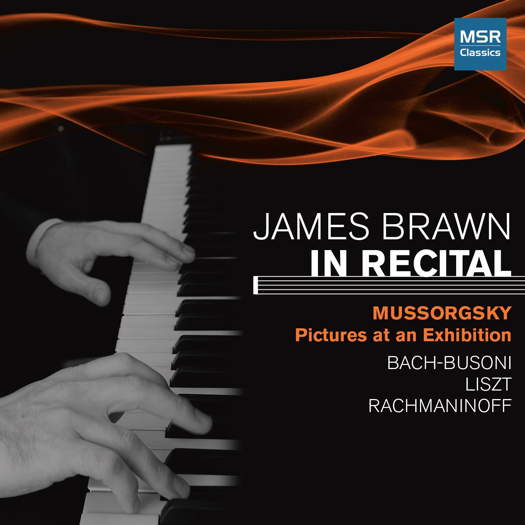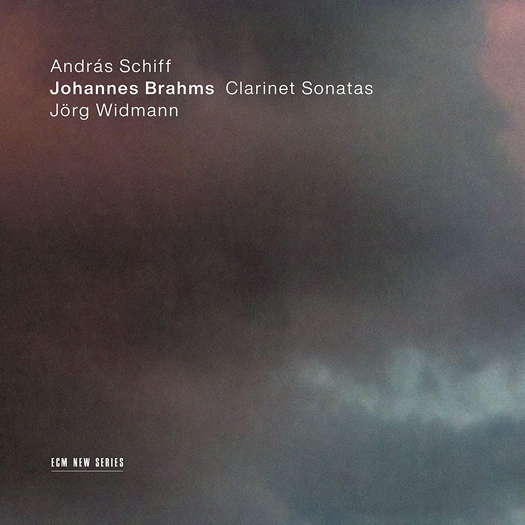 SPONSORED: CD Spotlight. True Command - James Brawn plays Bach, Liszt, Musorgsky and Rachmaninov - recommended by Andrew Schartmann.
SPONSORED: CD Spotlight. True Command - James Brawn plays Bach, Liszt, Musorgsky and Rachmaninov - recommended by Andrew Schartmann.
All sponsored features >>

Awakening the Joy for Life
BÉLA HARTMANN is impressed by music for clarinet and piano by Brahms and Widmann played by Jörg Widmann and András Schiff
'In every respect this is a superb CD, combining playing of the highest craft and musical understanding with great works of the past, as well as new contributions which are likely to become established regulars in the modern piano repertoire.'
This most welcome album is the result of the long association between the eminent pianist András Schiff and the clarinettist and composer Jörg Widmann. The works included, both of Brahms' late Clarinet Sonatas and Widmann's own neo-Brahmsian Intermezzi for piano, featured in a series of recitals given in various locations in 2018, including London's Wigmore Hall.
Widmann's Intermezzi were commissioned by András Schiff for the Salzburg Festival in 2010, and were composed specifically to suit the style of Schiff, a pianist much admired by Widmann for his ability to express much with restrained means and to reveal the latent tension of the music in an atmosphere of clarity and transparency. It is precisely these features that Widmann also identifies in the late piano works of Brahms, resulting in a perfect match between music and interpreter.
The performances capture the deep sympathy of the two performers with the music of Brahms, a figure central to the musical careers of both. The Sonatas show a duo perfectly in tune with each other, exploring the wide emotional and technical range of these magnificent works in absolute harmony, highlighting the epic, narrative quality of the First as much as the amorous warmth of the Second.
Inverted in order on the CD, the duo opens with the Second Sonata, the more glowing of the two. There are many possible approaches to the late works of Brahms, some interpreters such as Wilhelm Backhaus emphasizing the proximity to Beethoven, full of the energy and passion of older age. Others identify the melancholy of the later Schubert, the beauty of acceptance and restraint. This recording belongs firmly in the latter camp, implying, caressing, acquiescing. One could not wish for a more amabile opening, and the whole movement basks in warmth, with considerable freedom in tempo.
Listen — Brahms: Allegro amabile (Clarinet Sonata No 2)
(track 1, 0:02-0:31) © 2020 ECM Records GmbH :
The appassionato of the second movement is restrained, while the middle section finds Widmann matching the expansive piano sound with equally full clarinet sounds, beautiful even in the lower register.
Listen — Brahms: Allegro appassionato (Clarinet Sonata No 2)
(track 2, 2:42-3:15) © 2020 ECM Records GmbH :
The final Variations begin closest to those last piano works of Brahms, weaving layers of intricate rhythmic interplay together with melodic fragments glinting from every angle. The concluding variations then awaken the joy for life, a process captured perfectly with a growing vitality of sound and gesture by both Schiff and Widmann.
The First Sonata concludes the CD with music somewhat less acquiescing, altogether more dramatic. Here the performance becomes almost Furtwängler-like in its freedom, its seamless sliding from one phrase into the next, and its unaggressive grandeur. The focus here seems less warmth and beauty, although there is plenty of those, but more the storyline, the rhetoric of phrase and response. All of this comes naturally without artifice or self-consciousness; the measure of success is the arrival at the final chord as if in one breath. Much of this can be and has been done with more immediate beauty of sound from both instruments, more momentary magic in particular phrases. The slow movement is a case in point, where Brahms writes some of his most overtly sensual music. However, where many performers lose themselves in the beauty of the moment, here every return of the main theme feels inevitable and natural, all elements coming together in one long phrase.
Listen — Brahms: Andante un poco adagio (Clarinet Sonata No 1)
(track 10, 4:07-5:01) © 2020 ECM Records GmbH :
The third movement is graceful as requested, but with a touch of the country adding a different kind of sensuality.
Listen — Brahms: Allegretto grazioso (Clarinet Sonata No 1)
(track 11, 0:00-0:48) © 2020 ECM Records GmbH :
The final movement is all youth and energy, reminiscences from his early Piano Sonatas taking this far from the late Intermezzi and Klavierstücke - all once again realized with vigour and happy precision by Widmann and Schiff.
Listen — Brahms: Vivace (Clarinet Sonata No 1)
(track 12, 4:12-5:19) © 2020 ECM Records GmbH :
Widmann has from the first been a composer interested in referencing music of the past in his works, however much his compositional style may include trappings of musical modernism such as novel methods of notation and sound production. A frequent performer on concert stages around the world, many of his works were written to be performed by himself in the context of more traditional classical music, rather than for niche occasions devoted purely to experimental innovation. These Intermezzi came as part of a series of piano works relating to specific composers, toying with and embedding their style within Widmann's own. There are Reminiscences (Schubert), Humoresques (Schumann), a Sonatina Facile (Mozart), even a Diabelli Variation (Beethoven) - each work mostly avoiding actual quotations but rich in unmistakeable allusions, both in terms of harmonic and gestural similarities and in more abstract terms: 'Latently menacing structures of melancholic beauty emerge from almost nothing here' is Widmann's observation on late Brahms, and his guiding principle in his own Intermezzi.
The five Intermezzi are of unequal length, the central third as long as the others together, the first merely an enigmatic setting of scene. They remain largely in the realm of restraint, only the third Intermezzo, marked 'Mit dunkler Glut' (With dark fervour) showing glimpses of the Brahms of the G minor Ballade from Op 118 or the E flat major Rhapsody from Op 119.
Listen — Widmann: Mit dunkler Glut (Intermezzi)
(track 6, 0:00-0:37) © 2020 ECM Records GmbH :
But they are full of unsettling and unsettled beauty, both in their Brahmsian allusions as in their more contemporary passages. The fourth Intermezzo, entitled 'Wiegenlied' (Lullaby) has particularly sensual moments, even if it comes to an abrupt and violent end.
Listen — Widmann: Wiegenlied (Intermezzi)
(track 7, 0:00-1:00) © 2020 ECM Records GmbH :
András Schiff is a great interpreter of these pieces, capturing the menace and melancholy with beautiful pianistic sonority and transparency, and perfectly judging the movement of the music.
It will be, and has already been said, that Widmann's fondness for allusions to past great composers - which nota bene even range as far as Boulez - is a form of pastiche, and that the attraction of these works is merely the attraction of the models, embedded in a formality of modernism designed to hide their lack of originality. However, amongst the many possible ripostes to this charge let two be highlighted: The works of Widmann are beautiful, sensual, above all musical works, often exhilarating, always full of life and imagination, written with the highest degree of craft and tonal understanding - is that not precisely what we search for in a new work of music? It is not a coincidence that Widmann is one of the most performed composers of our time, performed by musicians of the highest calibre who are clearly grateful for the chance to play some new music the audience will genuinely enjoy. The second riposte is more general: since the Middle Ages composers have drawn on music of the past to enrich their own - contemporary listeners to Bach's works will have recognized his allusions to Palestrina, much of Brahms owes colossal debts to Beethoven and Schubert, and Debussy and Scriabin would have been unthinkable without Chopin and Schumann. More fundamentally, many composers of the Classical Period saw their primary source in the popular and folk music of their time, giving their music an element of familiarity to balance the innovation and sophistication. Widmann is doing nothing else than this, and he is in the process giving us music that can be enjoyed by both performer and listener.
In every respect this is a superb CD, combining playing of the highest craft and musical understanding with great works of the past, as well as new contributions which are likely to become established regulars in the modern piano repertoire.
Copyright © 28 October 2020
Béla Hartmann,
Surrey, UK

CD INFO: BRAHMS CLARINET SONATAS - JÖRG WIDMANN, ANDRÁS SCHIFF
FURTHER INFORMATION - JÖRG WIDMANN
FURTHER INFORMATION - ANDRÁS SCHIFF
FURTHER INFORMATION - JOHANNES BRAHMS
FURTHER INFORMATION - ECM RECORDS



